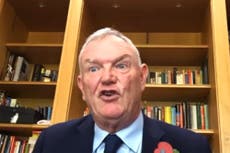Diversity is one of football’s major challenges - Greg Clarke proved he wasn’t the man to tackle it
How can the FA lead on diversity if one of its leading figures doesn’t even understand some of the basic language around it?

Your support helps us to tell the story
From reproductive rights to climate change to Big Tech, The Independent is on the ground when the story is developing. Whether it's investigating the financials of Elon Musk's pro-Trump PAC or producing our latest documentary, 'The A Word', which shines a light on the American women fighting for reproductive rights, we know how important it is to parse out the facts from the messaging.
At such a critical moment in US history, we need reporters on the ground. Your donation allows us to keep sending journalists to speak to both sides of the story.
The Independent is trusted by Americans across the entire political spectrum. And unlike many other quality news outlets, we choose not to lock Americans out of our reporting and analysis with paywalls. We believe quality journalism should be available to everyone, paid for by those who can afford it.
Your support makes all the difference.There were many elements of Greg Clarke’s performance on Tuesday that were just astonishing, but one of the most remarkable is this: the former FA chairman attended a committee hearing that was not specifically about racism, sexism or homophobia in the game, and yet somehow managed to illustrate attitude problems in the sport related to each, to ultimately result in an apology and his resignation.
He literally talked his way out of a job.
The most generous interpretation - and this is by now a stretch - is that he was just clumsy with his words; that it was just a 63-year-old man displaying an old-fashioned thought process.
Yet that alone is why his position should have come under question.
Diversity is now one of football’s major challenges, and is something the game must lead on. It has a social role, and a unique position as the universal sport.
The Football Association has repeatedly been confronted about this, and its responses have regularly been questioned. Most pointedly, the body has recently come under huge scrutiny for the profile of its board. It is only three years since Clarke had to apologise for referring to the idea of “institutional racism” as “fluff”.
These are not just gaffes, or mere words, though.
One of the crucial points in this whole challenge is that language matters. It’s a first step in changing attitudes, making people realise and bringing action. It dictates and conditions mindsets, reveals thinking, and changes thinking.
So it really comes to this: how can the FA lead on diversity if one of its leading figures doesn’t even understand some of the basic language around it, and the problems around language? This, after all, is literally just the start of the problem.
It indicates a fundamental inability to understand some of the more tangible issues around it all.
That’s the only question that can come after statements like these.
“If you go to the IT department at the FA there's a lot more south Asians than there are Afro-Caribbeans. They have different career interests.”
There were then the comments that coming out as gay is “a life choice”, or the reference to “high-profile coloured footballers”.
A man that evidently needs such education on the basics of this problem - the words around it - cannot credibly or authoritatively lead on one of the game’s greatest and most complex challenges.
This is why it was right he resign.
The great irony is that if there was more diversity on the FA board, some of this might have been mitigated. Diversity is an essential starting point in facilitating greater education, and realisation of what language can and can’t be used.
It is also why the Black Lives Matters movement still matters. It is why players should not stop kneeling.
The point, very clearly, hasn’t been made.
Too many people in football don’t yet realise what this is all about. They don’t understand. That has just been illustrated by one of its most prominent figures, in astounding manner.
Even Clarke’s resignation statement betrayed a lack of sensitivity, as he appended with the thought that he had been “actively considering standing down for some time”.
The FA is now in crisis, and one that was completely avoidable.
It should be an opportunity to tackle issues that should have already been confronted long ago. It’s time for much more than words.



Join our commenting forum
Join thought-provoking conversations, follow other Independent readers and see their replies
Comments